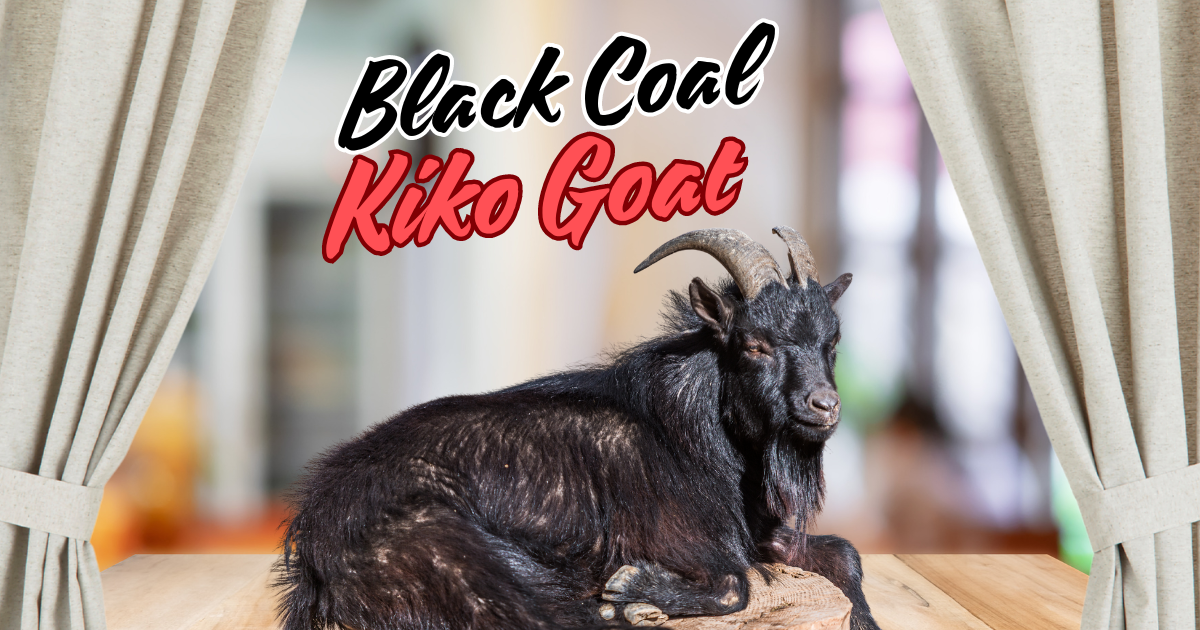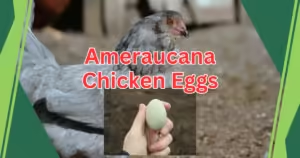The Black Coal Kiko Goat is a unique and resilient breed that has gained popularity among farmers and livestock enthusiasts. Known for its adaptability and excellent meat production qualities, this goat breed is a valuable addition to any farm. In this article, we will explore 7 important facts about the Black Coal Kiko Goat, including its characteristics, care requirements, breeding tips, and more.
What Is a Black Coal Kiko Goat? Understanding This Unique Breed
The Black Coal Kiko Goat is a specific variation of the Kiko goat breed, renowned for its hardiness and productivity. Originating from New Zealand, the Kiko goat was developed by crossbreeding feral goats with dairy breeds to create a robust and low-maintenance meat goat. The Black Coal variation stands out with its distinctive black coat, making it easily recognizable and highly sought after by farmers.
Key Characteristics of the Black Coal Kiko Goat:
- Appearance:
The Black Coal Kiko Goat is characterized by its shiny black coat, strong build, and well-muscled frame. Its sleek appearance is not only aesthetically pleasing but also indicates its robust health and vitality. - Size and Weight:
Mature bucks (males) typically weigh between 200-300 pounds, while does (females) range from 120-200 pounds. This size makes them an excellent choice for meat production. - Temperament:
Known for their calm and friendly demeanor, they are easy to handle and manage. They are social animals that thrive in groups and get along well with other livestock. - Adaptability:
These goats are highly adaptable to various climates and environments, making them ideal for farmers in diverse geographic locations. Their ability to thrive in harsh conditions with minimal care is one of their standout features. - Reproductive Efficiency:
They have a high reproductive rate and are known for their ease of kidding (giving birth). They often have multiple births, which enhances their value for meat production.
Understanding these key characteristics helps farmers and livestock enthusiasts appreciate why the Black Coal Kiko Goat is such a valuable and versatile breed.
Black Coal Kiko Goat Characteristics: What Makes Them Special?
This Goat has several unique characteristics that set it apart from other goat breeds. These features contribute to its popularity among farmers looking for a low-maintenance and productive livestock option.
Unique Characteristics of Black Coal Kiko Goats:
- Hardiness and Health:
This Goat is known for its robust health and resistance to common diseases and parasites. This natural resilience reduces the need for frequent veterinary interventions, making them a cost-effective choice for farmers. - Efficient Grazers:
These goats are excellent foragers and can thrive on a diet of roughage and low-quality pasture. They are highly efficient in converting poor-quality forage into quality meat, which is beneficial for farms with limited resources. - Low Maintenance:
Unlike some other breeds, they require minimal supplemental feeding and care. Their ability to thrive with minimal input makes them an ideal choice for farmers seeking a low-maintenance livestock option. - High Meat Yield:
The breed is primarily raised for meat production due to its high growth rate and excellent muscle development. The meat of the this Goat is lean and tender, making it a preferred choice in the market. - Longevity:
With a lifespan of up to 10-15 years, the Black Coal Kiko Goat is a long-lived breed, providing a sustainable and long-term investment for farmers.
These unique characteristics make the Black Coal Kiko Goat an attractive option for both small-scale and commercial farming operations.
How to Care for Black Coal Kiko Goats: A Complete Guide
Proper care is essential for maintaining the health and productivity of your Black Coal Kiko Goats. From housing and feeding to health management, here’s a comprehensive guide to help you keep your goats thriving.
Comprehensive Care Guide for Black Coal Kiko Goats:
- Housing and Shelter:
Provide a sturdy and weather-resistant shelter for your goats. The shelter should protect them from extreme weather conditions such as rain, wind, and excessive heat. Ensure there is enough space for all goats to move around comfortably. - Feeding and Nutrition:
While they are efficient foragers, supplement their diet with quality hay, grains, and minerals to support growth and health. Provide fresh water at all times and consider adding mineral supplements to prevent deficiencies. - Health Management:
Regular health checks are crucial. Monitor your goats for signs of illness, such as changes in behavior, loss of appetite, or abnormal feces. Deworm your goats regularly and vaccinate them against common diseases like tetanus and enterotoxemia. - Hoof Care:
Regular hoof trimming is essential to prevent issues like hoof rot or overgrowth, which can lead to lameness. Check your goats’ hooves monthly and trim as needed. - Breeding and Kidding Management:
Monitor does during pregnancy and provide additional nutrition to support their needs. Ensure a clean and safe environment for kidding, and be prepared to assist if complications arise during birth. - Socialization and Enrichment:
Goats are social animals and thrive in a group setting. Provide them with opportunities to interact with each other and include enrichment items like logs or rocks to climb on. - Parasite Control:
Implement a parasite control program, including regular deworming and pasture rotation. This helps reduce the risk of internal parasites, which can significantly impact goat health.
By following these care guidelines, you can ensure that your Goats remain healthy, productive, and content.
Feeding and Nutrition Tips for Black Coal Kiko Goats
Proper nutrition is crucial for the growth, health, and productivity of your Black Coal Kiko Goats. Here’s what you need to know about feeding these goats to ensure they thrive.
Diet and Nutrition for Black Coal Kiko Goats:
- Forage and Grazing:
They are natural foragers and can thrive on a diet primarily composed of pasture and browse. Ensure that they have access to a variety of grasses, shrubs, and leaves, which provide essential nutrients. - Hay and Supplementary Feed:
During the winter or dry seasons when pasture is limited, provide high-quality hay as the primary source of forage. Alfalfa hay is a good option due to its high protein content. Supplement with grains such as oats or barley if necessary. - Mineral Supplements:
Provide a free-choice mineral supplement specifically formulated for goats. This helps prevent deficiencies in essential minerals like calcium, phosphorus, and selenium, which are crucial for bone development and reproductive health. - Water Requirements:
Always provide clean, fresh water. Goats need a constant supply of water to aid digestion and maintain overall health. Ensure that water containers are cleaned regularly to prevent contamination. - Avoiding Toxic Plants:
Be aware of plants that are toxic to goats, such as azaleas, oleander, and certain types of ivy. Remove any potentially harmful plants from grazing areas to prevent accidental ingestion.
By providing a balanced diet and ensuring access to essential nutrients, you can support the health and productivity of your Black Coal Kiko Goats.
Black Coal Kiko Goat Breeding: Everything You Need to Know
Breeding Black Coal Kiko Goats can be a rewarding experience, whether you’re looking to expand your herd or produce quality meat goats. Here’s what you need to know about breeding this unique goat breed.
Breeding Tips for Black Coal Kiko Goats:
- Selecting Breeding Stock:
Choose healthy, well-conformed bucks and does for breeding. Look for animals with good body condition, strong legs, and no history of reproductive issues. Select breeding stock that exhibits the desirable traits of the Black Coal Kiko Goat, such as good muscle development and disease resistance. - Breeding Season:
They are seasonal breeders, with the breeding season typically occurring in the fall. Does come into heat every 18-21 days, and the gestation period is approximately 150 days. - Nutrition During Pregnancy:
Pregnant does require additional nutrition to support fetal development. Increase their protein intake and provide access to high-quality forage and supplements. Avoid overfeeding, as this can lead to complications during kidding. - Kidding and Postpartum Care:
Monitor does closely during the kidding process. Ensure a clean and safe environment for birth, and be prepared to assist if necessary. Provide plenty of fresh water and a comfortable area for the doe to rest and bond with her kids. - Raising the Kids:
Kids should nurse from their mother within the first few hours after birth to receive colostrum, which is vital for their immune system. If the doe has difficulty feeding her kids, consider bottle-feeding with a high-quality goat milk replacer.
By following these breeding tips, you can successfully breed and raise healthy Black Coal Kiko Goats, ensuring a thriving and productive herd. If you’re a fan of unique black-coated animals, you might also enjoy learning about the 5 Reasons to Adopt a Black Maine Coon Kitten. These majestic felines have some incredible traits too! Read more here.
Conclusion: Why Black Coal Kiko Goats Are a Great Choice for Livestock Farming
In conclusion, the Black Coal Kiko Goat is an exceptional breed for livestock farming due to its hardiness, adaptability, and productivity. Whether you’re a seasoned farmer or new to goat farming, this breed offers numerous benefits, including excellent meat quality, low maintenance needs, and resistance to common health issues.
By following the care, feeding, and breeding tips outlined in this article, you can ensure the health and success of your Black Coal Kiko Goat herd. Their resilience and efficient foraging abilities make them a sustainable choice for diverse farming environments.
Whether you’re looking to start a small-scale operation or expand your current farm, the Black Coal Kiko Goat is a versatile and valuable addition to any livestock farming endeavor. Their ability to thrive in various conditions and their high reproductive efficiency make them a top choice for farmers seeking a profitable and manageable goat breed.
FAQs About Black Coal Kiko Goats
- What is a Black Coal Kiko Goat?
The Black Coal Kiko Goat is a variation of the Kiko breed, known for its black coat and high productivity. It is primarily raised for meat production and is valued for its resilience and adaptability. - How much space do Black Coal Kiko Goats need?
Each goat should have at least 200-250 square feet of space in a pasture to graze and move around comfortably. Adequate space helps prevent overcrowding and stress. - What do Black Coal Kiko Goats eat?
These goats are excellent foragers and can eat a variety of grasses, shrubs, and leaves. Supplement their diet with high-quality hay, grains, and mineral supplements as needed. - How often should I deworm my Black Coal Kiko Goats?
Deworming schedules vary based on local conditions and the prevalence of parasites. Generally, deworming every 4-6 months is recommended, but consult a veterinarian for a tailored plan. - How long do Black Coal Kiko Goats live?
With proper care, they can live up to 10-15 years, although their productivity as meat goats is highest during their first few years. - Can Black Coal Kiko Goats be kept with other animals?
Yes, they are social and can coexist with other livestock such as sheep, cattle, and horses. Ensure that all animals have adequate space and resources to avoid competition and stress. - What is the average gestation period for Black Coal Kiko Goats?
The gestation period for goats is approximately 150 days. Does typically give birth to 1-3 kids per pregnancy. - Are Black Coal Kiko Goats good for beginners?
Yes, their hardiness and low maintenance requirements make them an excellent choice for beginners in goat farming. - How can I prevent hoof problems in my goats?
Regular hoof trimming and maintaining dry, clean living conditions are key to preventing hoof issues such as rot and overgrowth. - What are the main uses of Black Coal Kiko Goats?
They are primarily raised for meat production due to their excellent growth rates and meat quality. They are also used for brush control and land management.

Joseph Bush is a seasoned writer and researcher with over 7 years of experience covering a wide range of general topics, from lifestyle and technology to business and current events. He is dedicated to producing fact-checked, reader-friendly content that informs, engages, and empowers readers.
Throughout his career, Joseph has followed strict editorial guidelines, relied on reputable sources, and ensured every article meets the highest standards of accuracy and clarity. His expertise spans multiple fields, allowing him to explain complex topics in a way that’s easy to understand.
Passionate about continuous learning, Joseph stays updated on industry trends and best practices to deliver trustworthy, well-rounded insights. Readers can rely on his work for its credibility, depth, and real-world relevance.




